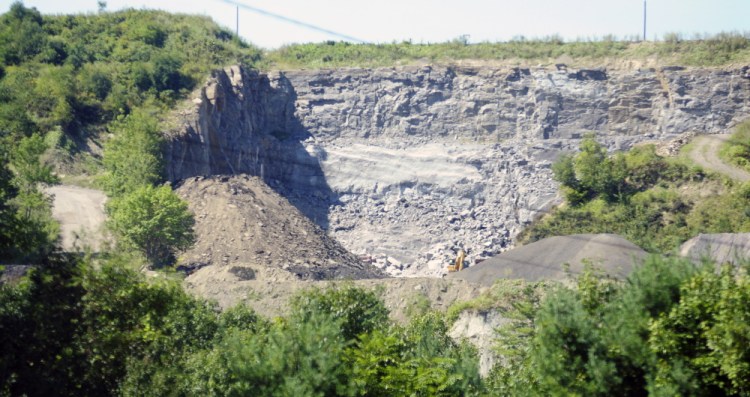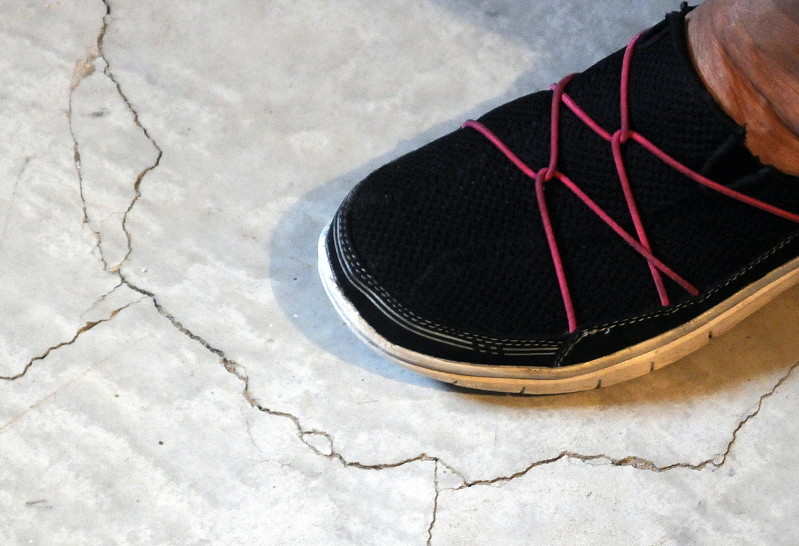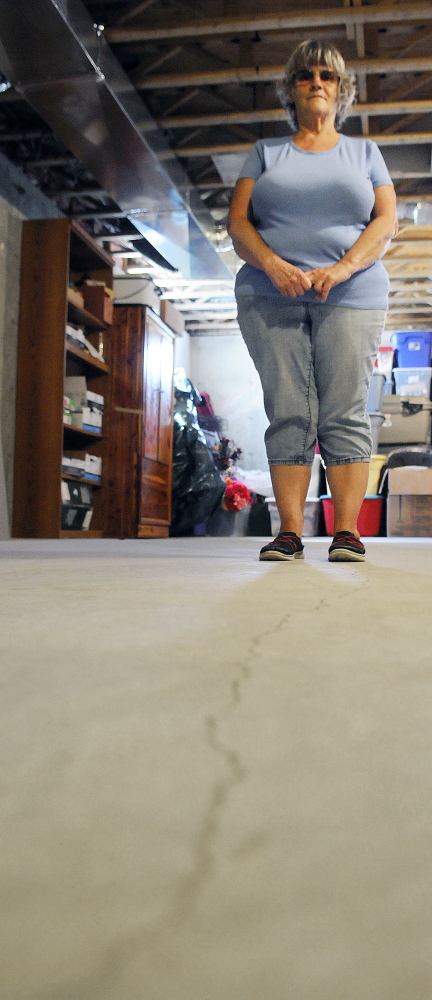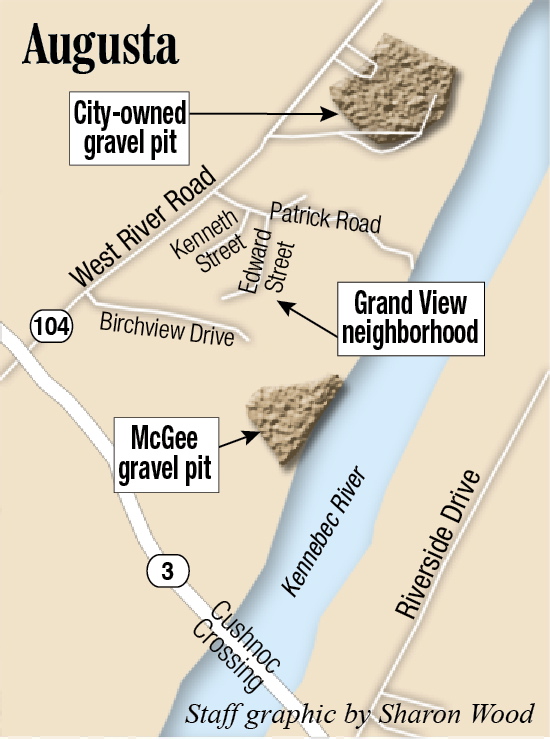AUGUSTA — Some residents near a quarry operation in a pit off West River Road that has been controversial with its neighbors say a May blast that prompted the city to file a lawsuit also caused cracks in the floors of their homes.
A resident who lives about two-tenths of a mile north of the pit’s entrance on West River Road and roughly 2,000 feet away from the pit itself says she believes the concrete floors and walls of the basement in her eight-year-old home were cracked by the May 13 blast, which she said felt and sounded like a bigger blast than other blasts at the pit owned by Steve McGee Construction.
Donna Bonenfant said gaps of roughly a quarter-inch also opened up between several of the floor joists and the main support beam of the main floor of her home, visible from the basement, gaps which she said weren’t there before the blast. What appear to be water stains are visible around some of the cracks in her basement walls.
“I don’t know what to do about these. What if it leaks?” Bonenfant said, pointing to one of several cracks spread across parts of the concrete basement floor of her home. “I know to expect some cracks, but this many? A cement contractor looked at it and said there is no way all these cracks would come from just the house settling.”
Across the Kennebec River from the pit site, Riverside Drive resident John Liacos said he noticed hairline cracks in some of the ceramic floor tiles installed when his home’s kitchen was redone in the spring of 2014, which he doesn’t believe were there before the May blast. He said he’s also discovered small cracks in the drywall of the kitchen ceiling.
Liacos acknowledged he’s not sure of the date when he first noticed the cracks, but said a contractor who looked at the cracks said they had to have been caused by “something serious,” and Liacos suspects it was the blast.
Bonenfant and Liacos both said they contacted the company that did the blasting, Maine Drilling and Blasting, to file claims for the damage. Both said their claims were rejected.
“We got a letter saying, sorry, we’re not responsible for it,” Liacos said. “If nobody is willing to admit it, what are you going to do? I want to be treated fairly. I was hoping to get some sort of resolution from Maine Drilling and Blasting.”
Kathy Guerin, marketing director for Gardiner-based Maine Drilling and Blasting, said the company was not able to respond to specific details about the Augusta residents’ claims, saying only, “Please know that safety is very important to Maine Drilling and Blasting, and we work very hard with customers, communities and the general public to best manage appropriate blasting services.”
A letter from a Maine Drilling and Blasting safety specialist sent to Bonenfant said the company’s investigation into her claim consisted of a complete review of project blasting logs, seismographic readings, review of the pre-blast survey and a post-blast claim inspection.
“After a complete review of that data available to us, we have determined that blasting is not the cause of your claims as presented,” the letter stated.
Geoff Cobb, a project manager for McGee Construction, said he doubted the blast at the pit caused damage to neighbors’ homes but said the blasting was the responsibility of Maine Drilling and Blasting to oversee and ensure that it didn’t cause damages.
“We rely on Maine Drilling and Blasting to do what’s right,” he said.
Bonenfant, mother of at-large City Councilor Jeffrey Bilodeau, said she wasn’t sure what she’s going to do but said she has not filed a lawsuit over the incident.
Bonenfant said she and others home the day of the May blast said it felt and sounded like an earthquake and seemed bigger than other blasts coming from the quarry.
She said she believes a 2010 blast also caused cracks in her basement and cracks to the drywall in corners on the main floor of the home. She said they paid a contractor $1,000 to fix some of those cracks.
Liacos said he does not intend to file a lawsuit for the damages to his home.
The city, however, has filed a lawsuit over the same blast, alleging the blast exceeded allowable standards and seeking to revoke the Gardiner-based McGee Construction’s permit to blast and extract rock in Augusta.
The city’s lawsuit alleges the blast was too large and exceeded standards of the Augusta Blasting Ordinance. The court filing states the blast exceeded both the maximum peak sound pressure limit of 133 decibels and the maximum ground vibration standard, measured in peak particle velocity, of 0.75 inches per second between 500 and 5,000 feet from the blast.
According to Stephen Langsdorf, the city’s attorney, data recorders indicated the blast created a shock wave of 135.5 decibels, and in one location the peak particle velocity hit 1.04 inches per second, and 0.82 inches per second and 0.79 per second in another location, all above the 0.75 per second maximum.
Langsdorf said vibrations over that level can cause drywall to crack, and shock waves of over 135 decibels can damage buildings.
Gregory Farris, Steve McGee Construction’s attorney, said previously the blast did not exceed the city’s standards and “any abnormal readings were due to monitoring equipment issues and not caused by the blast. The blast complied with the sound pressure and vibration standards set by the city, and no damage was done as a result.”
The pit where the blast took place has been the subject of multiple disputes over the last several years between the operator and its neighbors, especially those in the nearby Grandview neighborhood, over issues including dust, noise and odors when a since-closed asphalt plant was operated by another company there in the summer of 2011.
Keith Edwards — 621-5647
kedwards@centralmaine.com
Twitter: @kedwardskj
Send questions/comments to the editors.







Success. Please wait for the page to reload. If the page does not reload within 5 seconds, please refresh the page.
Enter your email and password to access comments.
Hi, to comment on stories you must . This profile is in addition to your subscription and website login.
Already have a commenting profile? .
Invalid username/password.
Please check your email to confirm and complete your registration.
Only subscribers are eligible to post comments. Please subscribe or login first for digital access. Here’s why.
Use the form below to reset your password. When you've submitted your account email, we will send an email with a reset code.